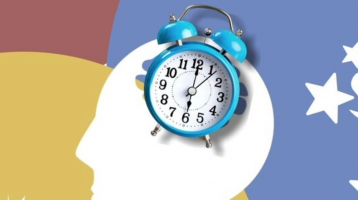Do you get sleepy when you are cold? Researchers have discovered new insights about how temperature affects the circadian rhythm.
The circadian rhythm is a 24-hour cycle that determines when we sleep, when we wake and when our body performs important cell repair processes. This internal clock is set by external cues such as light and temperature. While the mechanism behind light’s effects on the circadian rhythm has long been known, its responses to changes in temperature have remained a mystery. However, researchers have now gained new insight as to exactly how temperature affects the circadian rhythm.
Fruit Flies and Temperature
Every living creature has a circadian rhythm. In particular, fruit flies are often studied because they mature quickly, allowing researchers to quickly see the effects of genetic changes. In addition, fruit fly cells are not so different from human ones, so we can make important discoveries about cell biology from studying these little insects. In a recent study, scientists looked at how the fruit fly brain senses changes in temperature to try to determine exactly how temperature affects the circadian rhythm.
Because fruit flies do not have skin to sense temperature, they have temperature sensors in their antennae. Fruit flies use temperature input to synchronize their circadian rhythm to their environment. However, it was found that fruit flies that lack the gene IR25A are unable to adjust their circadian rhythm to respond to changes in temperature. This suggests that proteins made by IR25A, which have been appropriately named Period and Timeless, are the ones responsible for sensing and/or responding to temperature as a timing cue.
New Insights Into How Temperature Affects the Circadian Rhythm
 This research is important because it provides a genetic basis for what scientists, have long known: Changes in temperature affect the circadian rhythm. However, temperature does not affect your internal clock in the same way as light and other external cues. There is one main pathway for light signals to affect circadian rhythm; from the retinas to the suprachiasmatic nucleus of the hypothalamus to the pineal gland, where melatonin is made. In contrast, there appear to be multiple paths for the temperature to affect the circadian rhythm.
This research is important because it provides a genetic basis for what scientists, have long known: Changes in temperature affect the circadian rhythm. However, temperature does not affect your internal clock in the same way as light and other external cues. There is one main pathway for light signals to affect circadian rhythm; from the retinas to the suprachiasmatic nucleus of the hypothalamus to the pineal gland, where melatonin is made. In contrast, there appear to be multiple paths for the temperature to affect the circadian rhythm.
In addition, there is a difference in the way temperature acts as a timing cue. While it cannot “reset” internal clocks, as light and melatonin can, changes in temperature make them skip forward or backward slightly. This may be part of the reason that people become sleepy when they are cold, or why people generally have more energy during warm weather months.
How Does This Apply to Humans?
While this study was performed on fruit flies, there are many implications for human health. Fruit flies have similar cell processes to humans, which is why they are so often studied to look for the genes behind certain bodily processes. There is a large body of research suggesting that the human circadian rhythm also exhibits a marked response to changes in temperature. While further research will be needed, it is likely that we have a gene similar to IR25A that makes similar proteins with similar functions.
There may be a time in the future when temperature is used to treat circadian sleep disorders, much as light therapy and melatonin are used today. Temperature appears to have a great deal of impact on the circadian rhythm and may be a core issue for people with sleep problems and other circadian rhythm disorders.







